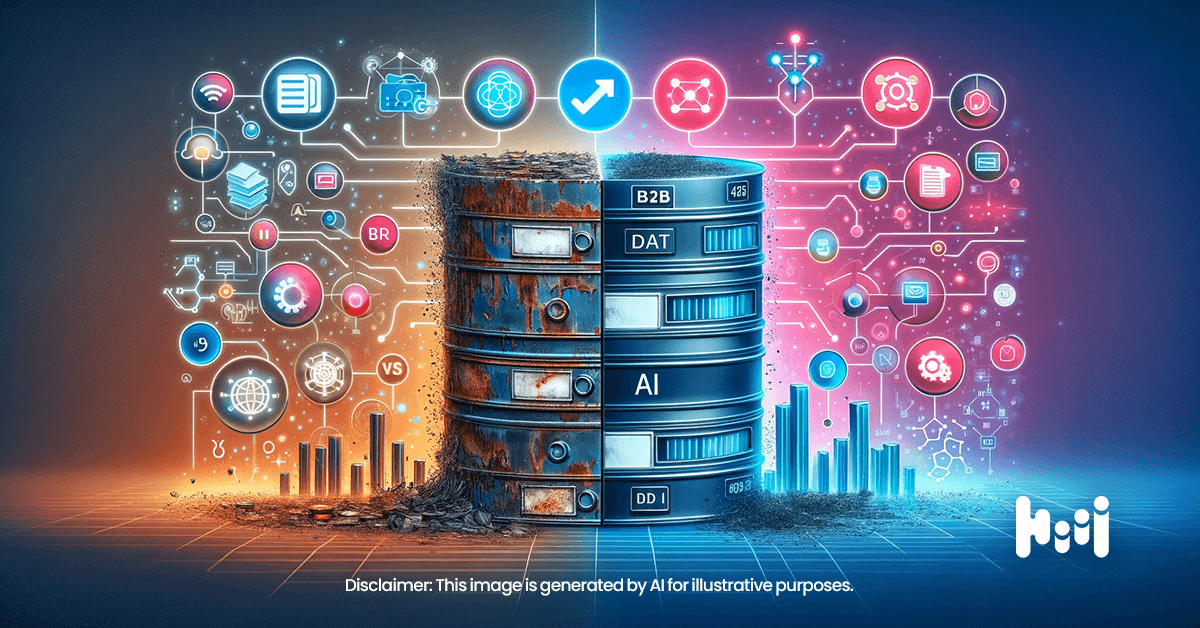
Think of B2B data as the foundation for all your sales prospecting activities. The more accurate, high-quality B2B data you have on hand, the stronger and more impactful your prospecting efforts will be. On the flip side, if your data quality isn’t up to snuff, whether it’s invalid, out of date, or non-compliant, your prospecting efforts will ultimately come up short in helping you find qualified, purchase-intent leads to fill your sales pipeline and drive conversion.
Hence, accurate B2B data isn’t just integral to sales prospecting; it’s vital to facilitating a streamlined customer journey, speeding the sales cycle, and encouraging consistent business growth.
Core benefits of accurate B2B data
Have you ever spent a substantial amount of time and effort prospecting potential customers only to miss the mark in achieving your desired results? You’re not alone. According to our recent benchmark report, 33% of today’s sales leaders say prospecting is the hardest part of the entire sales process, and 31% said inaccurate information presents the biggest challenge to prospecting productivity. These statistics just go to show how foundational data accuracy is and how its quality—or lack thereof—can ultimately affect your bottom line.
But to get a better understanding of data accuracy and its overall influence on sales productivity, you first need to know the kind of impact it has on your prospecting activities.
Here are four core benefits of using clean, accurate, high-quality data throughout the prospecting process, plus explanations of how these benefits help pave the way for increased conversion.
1. Improved lead generation and sales performance
The purpose of B2B sales prospecting is to find top-quality leads to keep your pipeline full of high-potential purchase opportunities. This way, you ensure your sales team a steady stream of viable leads to help usher through the buyer’s journey. Accurate B2B data, then, is the make-or-break factor when it comes to pinpointing these relevant buyers. The cleaner, more reliable your contact database is, the better you’ll be able to target potential customers who share the same criteria as your ideal buyer personas. And the more granular you can get with targeting, the better your chances are of spotting revenue-driving opportunities from a massive sea of prospects.
The good news is, most B2B contact databases use AI-powered systems and machine learning to process huge amounts of data, verify it for accuracy, and categorize data sets into digestible chunks. This allows you and your team to segment prospects according to shared characteristics, like industry type, company size, use of technological solutions, or level of professional experience, among other features. These smaller prospect segments offer an easier, more manageable way to target the right buyers. And because most databases come equipped with data enrichment capabilities, you can trust you have the correct contact information to initiate outreach. That means improved email deliverability, a boost in email open rates, and even an increase in email replies.
Most important, you can leverage accurate contact data to create compelling, personalized communications, which goes a long way with prospects. Want proof? According to research, 80% of buyers said they’re most likely to make a purchase from a company offering personalized engagements via email, social media, or other digital channels.
Here’s an example. Let’s say your B2B prospecting data reveals a segment of target prospects all work at large SaaS companies that develop point of sale systems for retailers. You can use this key piece of intel to craft tailored messaging, highlighting how your product offers seamless solution integration, which can help their customers optimize processes, increase efficiency, and facilitate swifter sales cycles. Your ability to connect with these prospective accounts relies heavily on the accuracy of your prospecting data.
2. Better customer insights
Most sales professionals describe B2B prospecting as looking for a needle in a haystack. Fortunately, access to accurate B2B data allows you to shrink that figurative haystack so your search area is more contained and much easier to manage, which increases your odds of connecting with ideal prospects. However, some B2B data sets pack a more powerful punch when it comes to narrowing down a list of prospective customers. And this kind of data is known as behavioral data.
B2B behavioral data is a collection of customer insights derived from the actions your prospects take across multiple digital touchpoints, like email, social media, and your own website or mobile app. For instance, if someone fills out a form to download a piece of gated content from your website, then registers for a webinar shortly thereafter, that person has signaled concerted interest in your offerings. You can now use these insights to better understand prospects’ business-related concerns and design more strategic methods of outreach.
Behavioral data encompasses a wide range of metrics that offer an all-important peek into your prospects’ preferences. These metrics include:
- Digital interactions with your brand
- Content downloads
- Keyword search history
- Webinar/event registrations
With accurate B2B behavioral data, you can get a more holistic view of your target customers beyond simple demographics. For example, you can see which content topics and keywords seem to generate the most interest among prospects or which touchpoints garner the most engagement. Also, you can track prospects’ digital interactions to determine the most opportune moment to initiate outreach via personalized messaging or with relevant content.
3. Increased efficiency
In sales, speed is the name of the game. Faster lead generation, more efficient processes, and quicker sales cycles all lend to significant business growth, and at the end of the day, that’s what matters most. It’s important to bring that kind of streamlined efficiency to your prospecting, as it’ll help lay the groundwork for future sales success. Accurate B2B data, therefore, is the not-so-secret ingredient to make it all happen.
Accurate B2B data allows you to save precious time and resources searching for viable prospects, as you can leverage essential insights to better gauge who, among all potential customers, meets your ideal criteria. Data accuracy also lends to proper prospect segmentation, which invites even more efficiency into the process.
Without all that reliable data analysis, you and your sales team can’t be sure if your buyer insights are even actionable, and you won’t be able to generate data-driven recommendations to improve prospecting success. Ultimately, this results in a prolonged sales cycle and a lot of missed opportunities.
4. Improved customer experience
One of the most critical measures of sales success lies in the customer experience. Give your prospects a positive experience, and you’ve got a pretty good shot at successfully progressing them further down the sales funnel. In contrast, providing your prospects a less-than-optimal experience is the fastest way to lose their interest, leaving them no choice but to search for products elsewhere.
Don’t run the risk of losing promising sales opportunities; instead, lean on accurate B2B data to provide a valuable, worthwhile customer experience for your prospects. That’s as simple as using prospects’ correct names and titles in any kind of sales interaction—a mistake like that is the fastest way to lose potential customers before sales conversations can even begin, as it sets a poor tone for the remainder of the customer journey. You can avoid this pitfall all together by doing your due diligence, relying on accurate B2B data to reference prospects’ correct information and provide them an optimal experience right from the jump. Consistent, credible data establishes this element of trust that’s so necessary to building strong relationships with potential customers.
Similarly, you can leverage accurate B2B data to properly track behavioral patterns and reoccurring trends in the sales journey. These analytics allow you to develop reliable data-driven insights you can then use to enhance certain aspects of the customer experience. For example, if your data reveals 100 prospects clicked on one of your digital ads, but the ad’s landing page shows a bounce rate of 80%, you can assume that landing page needs a good revamp in order to engage prospects more effectively.
Predictive insights like these enable you to design strategic sales efforts that correspond with your prospects’ expected needs. And the result? Happier prospects, more satisfied customers.
Get precise with your B2B data
Buyer behaviors, trends, and preferences shift constantly in today’s competitive B2B market. And with how often people switch jobs or find new opportunities, it can be a challenge collecting accurate B2B contact info and customer data. But that’s exactly what you need to drive reliable buyer insights to stay ahead of the competition. The more exact your B2B data is, the more effective your prospecting efforts will be.
Say goodbye to bad data
Want to enrich your existing B2B data with the most accurate, up-to-date information? Then check out Account Intelligence, and see how easy it is to connect with purchase-intent customers in the most efficient way possible.










